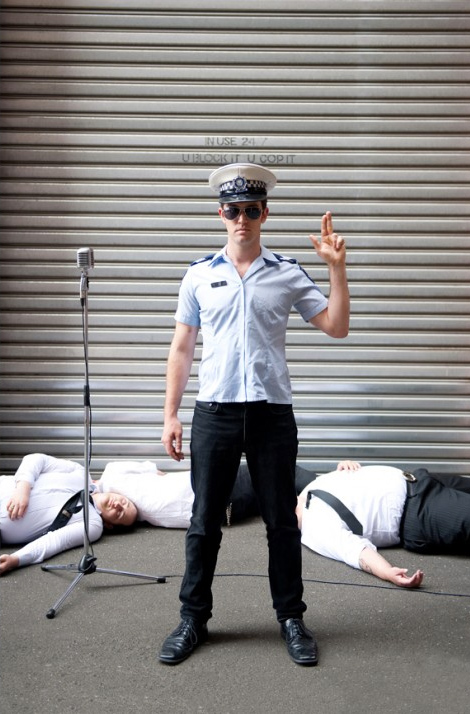no meaningful political analysis to this play

The Economist | Review
In July 2011, Anders Behring Breivik carried out a car bombing in the centre of Oslo and an armed assault on the nearby island of Utøya, which together resulted in the deaths of seventy seven people. The gun attack was ostensibly part of a decapitation strategy which was intended to take out an entire generation of young Labour party politicians. Brievik saw himself as firing the first shot in a forthcoming civil war to protect Norwegian “culture.” But most of his “manifesto” was cut and pasted from Wikipedia. He turned out to have no supporters, sympathisers, or even friends. Now fighting to avoid being legally designated a lunatic, Breivik has despaired that, “To send a political activist to a mental hospital is more sadistic and evil than to kill him!”
An enfant terrible of Melbourne theatre, Van Badham has taken the attacks personally. She has declared that, “I’m left-wing; if I were seventeen and Norwegian, I could easily have known, or even been, one of the teenagers being shot at by Breivik.” For Badham, Breivik’s victims died because they were left-wing and the Right needs to take responsibility for these “methodological, considered, ideologically-self-justified murders.” Along with the writer Tobias Manderson-Galvin, Badham is “giving the victims of a tragedy their deserved political context.” Their play “The Economist,” was first staged in Melbourne last December and it is now appearing at C Nova on Victoria Street,
What follows is essentially an attempt to drag Breivik out of the lunatic asylum and back into contemporary politics; to dangle his senseless carcass as a right-wing straw man. Ultimately the work of bratty self-publicists, this tasteless and exploitative project is merely an attempt to render the entirety of the Right – yes, all of it! – guilty by association. Unless, that is, Badham is simply lacking in imagination and she cannot comprehend how being right-wing differs from mental illness.
There is actually no meaningful political analysis to this play; only a sample of Breivik’s demented antics. The nearest that we get to a political point comes with the play’s embarrassingly crude title. When exempted from Norwegian military service, this version of Breivik, “Andrew”, is advised to become an “economist,” the snide implication being that in the light of the present financial meltdown, he could have done more damage to the world as a regular capitalist.
This all bodes badly for “The Economist,” but the energy of the cast and a general squeamishness about getting to grips with Breivik’s character spare the play from plunging too deep. The cast of six are filled with beans by Breivik’s story – they throw themselves into the play with the expertly-synchronised exuberance of cheerleaders at a big game, flipping in an instant from wryly thuggish policemen to the crew at Breivik’s gym to the whores who were insulted by his charmlessness. In this play you will learn absolutely everything that there is to know about Breivik. Its madcap chronology is a little reminiscent of those The-History-Of-America-In-Forty-Five-Minutes Fringe comedy shows.
Yet the play takes tremendous care to tiptoe around the man himself. Whilst Breivik was a steroid-popping muscle machine, he is here brought to life by the slender and quite undeniably feminine Zoey Dawson. Although Breivik was inconspicuous and quietly spoken, ninety per cent of Dawson’s performance is her voice. She screeches, yells, bellows and at times almost yodels Breivik’s lines. And although Breivik was so complex a character that his psychiatrists still cannot agree on the extent of his free will, Dawson’s Breivik is grossly unsophisticated. Humiliated by the police as a teenager, spending too much time on his farm as an adult, with his only friend an imaginary Norse god, these things are cited as if they explain Breivik’s behaviour, when in fact the correlation between cause and effect is just as ropey as it is in the “political” interpretation that he was driven to murder by watching too much Fox News.
Fittingly, as the island looms, Dawson’s Breivik ends up ranting like a hammy Bond villain who is about to hit the nuclear button. Not only are they unable to successfully politicise Breivik, but they cannot even in the end produce a credible lunatic. We would have had a better explanation of this Breivik’s actions had he discarded the policeman’s costume, dressed up as Frank Sinatra, and simply sang “My Way.”
“no meaningful political analysis to this play”
THE PLAYWRIGHT: This is a pretty grumpy, right-wing sounding review. Good on them for writing a review. Better luck next time. But lol for that quote it’s worth it. Haha.
